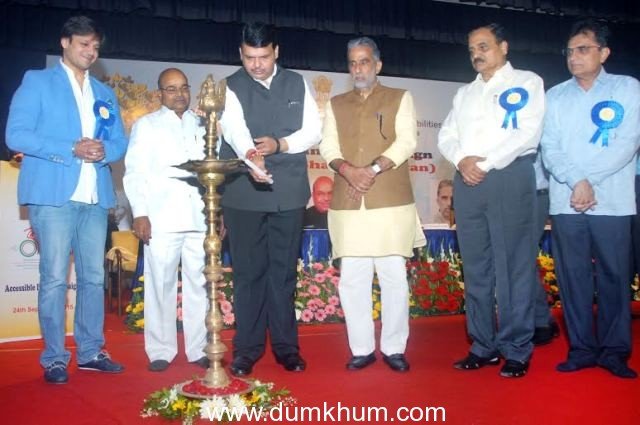Public buildings in most Indian big cities to be made disabled friendly – Thawarchand Gehlot.
(Government’s Accessible India Campaign or Sugamya Bharat Abhiyan’ sets timelines for improving accessibility in buildings, transport and communication)
The Centre has asked each state to identify 50-100 public buildings in major cities to be made easily accessible for Persons with Disabilities under the ambitious ‘Accessible India Campaign’ also known as ‘Sugamya Bharat Abhiyan’.
Speaking at the inauguration of a day long workshop on accessibility in Mumbai on Thursday, Union Minister for Social Justice and Empowerment, Thawarchand Gehlot said the government was working with renewed vigour to implement policies drawn up for the benefit of Persons with Disabilities. He said “Sugamya Bharat Abhiyan has ambitious targets with well defined timelines and we have sought cooperation of all the states in implementing it”.
The Minister said the Centre has drawn up a plan to identify at least 50 most important public buildings in 26 major metro cities and state capitals and at least 25 buildings in 22 other cities and capitals of smaller states and Union Territories. Four cities from Maharashtra viz. Mumbai, Pune, Nagpur and Nashik figure in the list of cities for Accessible India Campaign.
Mr. Gehlot said the identified buildings will then be made fully accessible to Persons with Disabilities via retrofitting of ramps, disabled friendly lifts, toilets as well as signages. In addition, 75 important Railway Stations as well as all the important domestic airports will be made fully accessible by July 2016.
Universal ID cards for Persons with Disabilities
Mr Gehlot said, of the 26.8 million Persons with Disabilities, less than half have been provided with disability certificates. “The thrust is on inclusiveness. The present problem with the disability certificate is that it is not universally recognized. A certificate issued in one district or state is not recognized in another state or district” he observed. To overcome this problem, the Minister stated that the Government has decided to issue Universal Identity Cards having Unique number to all the Persons with Disability within next one and a half year.
The Minister also said that the present definition of disability was not inclusive enough as it covered only seven types of disabilities. He said, the government has decided to increase the number of disabilities to 19 from the present 7, in a bid to expand the pool of beneficiaries and make it more inclusive.
Speaking on the occasion, Maharashtra Chief Minister Devendra Fadnavis said that the governments had the primary responsibility of creating an accessible environment for the Persons with Disabilities. He observed that, even though there were many laws and policies protecting the rights of Persons with Disabilities, the implementation at the ground level had been far from being satisfactory.
Vivek Oberoi lends his support for Accessible India Campaign
Bollywood Actor and social activist Vivek Oberoi, Union Minister of State for Social Justice and Empowerment, Krishan Pal Gurjar, Maharashtra Ministers Diwakar Raote and Raj Kumar Badole, Secretary, Social Justice and Empowerment, Lov Verma, experts on accessibility issues and representatives of NGOs were among those present. Among the highlight of the Workshop was the rendering of the National Anthem in sign language by the Helen Keller Institute of Deaf and Deafblind, Mumbai.
Mobile App for Crowd sourcing information about inaccessible buildings
The Department of Empowerment of Persons with Disabilities is in the process of creating a mobile app along with a web portal for crowd-sourcing the requests regarding inaccessible places. With the app, any person would be able to click a photograph or video of an inaccessible public place – say a school, library or any other public building and upload the same to the ‘Accessible India’ portal.
The portal will process the request for access audit, financial sanction and final retrofitting of the building to make it completely accessible. The government is also seeking engagement of big corporates and PSUs. They will be asked to offer their help to conduct access audit and for accessibility – conversion of the buildings, transport and websites.
As an offshoot of the campaign, the Department has also sought ‘Expression of Interest’ from IT firms to prepare the app in all Indian languages to locate nearest accessible places like Banks, ATMs etc.
On Board : a low disabled friendly devise for boarding a city bus
On Board’ is a low cost disabled friendly bus identification system for visually impaired developed by Prof. M Balakrishnan of IIT Delhi.
Visually impaired people usually avoid public transport. Right from knowing the bus route to availability of buses near them and boarding, they need assistance at every step. This system liberates them.
It is a radio frequency based system having two modules – one for the bus and the other for the user. User initiates a query for the bus route number by pressing a switch. Device speaks out numbers of buses arriving. User switches selection switch on module upon hearing the desired number. The bus responds with audio cue to let the Person Board independently.
More than 250 successful trials have been made of ‘On Board’ on BEST buses in Mumbai.











